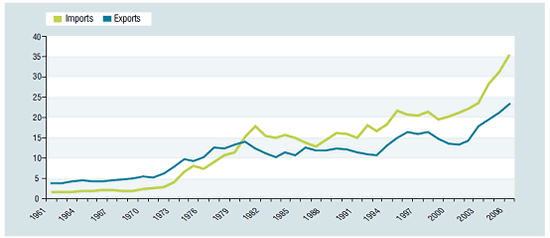Ineffective farming techniques and wasteful post-harvest practices have left sub-Saharan Africa as the region most likely to miss the first Millennium Development Goal: eradicating extreme hunger and poverty by 2015, warns the 2010 UNCTAD Technology and Innovation Report.
The report, released today, calls for a "green revolution" for Africa that cannot be based on well-publicized farming advances in Asia and Latin America, but built instead on technology and innovation aimed at the needs and capabilities of Africa´s millions of smallholder farmers and at coping with the continent´s varying climate conditions.
For example, while modern irrigation techniques can increase crops yields dramatically, most of them have been designed for relatively large and fairly sophisticated systems. Now, thanks to alternative new technologies such as low-cost drip irrigation, improved treadle pumps and low-cost plastic water tanks to store runoff, smallholders can benefit from modern irrigation techniques that would otherwise be unaffordable, given the small size of their farms and the limited capital available to them.
The report includes similar examples in such areas as biotechnology, fertilizers, pesticides, tilling, and post-harvest technologies. Innovative policies to improve the access of farmers to appropriate technologies also are covered. For example, a policy of "smart subsidies" to ease access to fertilizers has resulted in staggering increases in maize production in Malawi, demonstrating the key role credit and other instruments can play in enabling farmers to adopt effective existing technologies.
Noting that per capita food production in the least developed countries (LDCs) has declined continuously over the past 40 years -- dropping by one-fifth between the early 1970s and the mid-2000s -- the report argues that innovations and major improvements in the technologies employed by African smallholder farmers are needed to restore food security.
The report further contends that the sustained use of more advanced agricultural technologies by farmers, particularly in Africa, could play a potent role over the medium to long term in preventing food crises. And the TIR highlights the impact of stagnating productivity on the food security of Africa´s poor.
While Asia and Latin America have seen significant increases in agricultural productivity in recent decades, Africa´s agricultural productivity has not improved, and the gap between its agricultural imports and exports is widening.

Agriculture forms the basis of many African economies and provides the largest source of employment and livelihood for Africans. Stagnant agricultural productivity has created a serious food insecurity problem and has become a major development challenge for Africa.
The report notes that the core challenge is to support the smallholders who make up the bulk of the continent´s farmers, many of whom live at or below the poverty line.
Looking at ways to reverse declining agricultural productivity by adopting existing technologies and developing new ones, the report details the likely impacts of innovation in agricultural systems, of improvements in agricultural infrastructure, of services and land management practices, and of the development of more appropriate national policies.
Among the findings:
- Improving the mix of agricultural technologies used by African smallholders, and strengthening the innovation capabilities of African agricultural systems, are necessary but not sufficient conditions for improving farming performance on the continent.
- Local circumstances create insurmountable obstacles to replicating, in Africa, an Asian or Latin American-style Green Revolution based on intensifying the use of chemical fertilizers, pesticides, and irrigation in the production of high-yielding strains of a handful of cereal crops -- an approach that many agricultural experts say is not sustainable in any case.
- The technology package behind a genuinely African Green Revolution must be crafted with the continent´s tremendously varied human, ecological, and economic circumstances firmly in mind.
The report acknowledges there are no quick fixes. But it identifies several steps with the greatest potential for improving agricultural productivity and food security in the short term:
- Strengthening human and institutional capacities.
- Empowering farmers by including them in policy and programme design.
- Improving farmer support systems and markets.
The report puts forward 12 main recommendations , among them: i) Smallholder farmers need to be at the centre of policy so that agricultural research, development, and extension services meet the real needs of small-scale farmers; ii) Policy-making should be strengthened to create an enabling environment for agricultural innovation, and to allow some degree of policy experimentation; iii) Agricultural innovation systems need to be reinforced, including through better links to national, regional, and international research; iv) Agricultural investment should be targeted by putting resources into the physical and scientific infrastructure, linkages, and stronger extension services; v) Local agro-ecological conditions should be taken into account so that technologies are tailored to fit them and include appropriate and effective mixes of low-, medium- and high-tech solutions, along with traditional knowledge; and vi) Capacity-building and international cooperation on transferring and sharing technology should be reinforced.
In the medium and long term, making innovation systems more coherent, targeting external support more effectively, and increasing investment in agricultural research and development offer the greatest potential for improving food security in Africa, the report says. With the appropriate international support and the necessary political will, African agriculture can be transformed through science, technology, and innovation and contribute to broader economic growth and development on the continent, the TIR contends.


